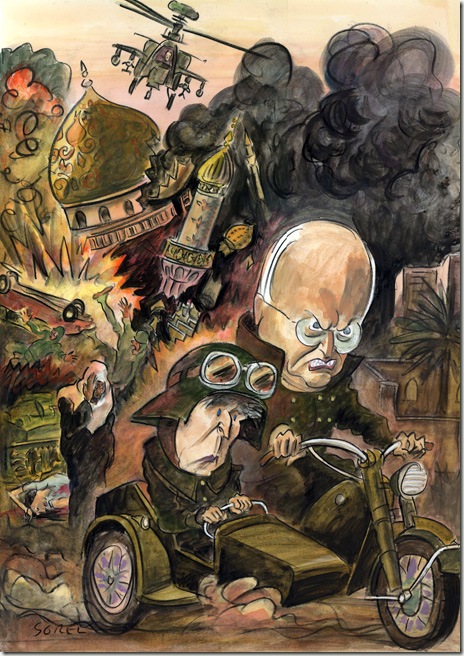As drunk as a judge
January 19, 2009
 The story is out in Britain about Deputy District Judge Esther Cunningham (photo), who had to be escorted from court after kissing a solicitor, swearing at an usher and insulting a prosecutor while ‘fortified’ with brandy. This from a disciplinary tribunal that ‘found it difficult to determine the correct sanction’, according to The Telegraph.
The story is out in Britain about Deputy District Judge Esther Cunningham (photo), who had to be escorted from court after kissing a solicitor, swearing at an usher and insulting a prosecutor while ‘fortified’ with brandy. This from a disciplinary tribunal that ‘found it difficult to determine the correct sanction’, according to The Telegraph.
Apparently, Cunningham caused uproar at a hearing in November, at which she was appearing as a solicitor, swaying and clutching a table to steady herself while interrupting proceedings. She also appeared drunk during a legal training course which she was conducting and spoke openly about wanting to punch the chairman of her legal governing body. Cunningham, 54, was banned from practising law for six months after admitting a series of charges including bringing the profession into disrepute. Six months in ‘purgatory’ might make this judge consider the fact that she needs help.
You don’t hear about drunk judges in Spain. Maybe there aren’t any.
On the other hand, you hear about insulting disciplinary proceedings against judges who fail to serve arrest orders on convicted paedophiles. In one notorious case, Sevilla Judge Rafael Tirado was fined a mere €1500 (half the maximum fine, as set by his colleagues) -and never suspended from his courtroom- for failing to make sure that the alleged murderer of five-year-old Mariluz Cortés was sent to jail on prior charges of molesting his own daughter. Tirado has appealed the fine. His court secretary, however, was suspended ‘without salary’ for two years, even though the ultimate responsibility belongs to the judge, who is the secretary’s boss.
 Meanwhile, the judges’ ‘union’ is threatening to strike all over Spain, rightly alleging that they are overwhelmed with work. Judging (forgive the pun) from the state of most of the country’s courtrooms, I’d have to agree with them. Amongst many other things, Spain’s judicial system, which has been notoriously inefficient for much too long, has never been ‘computerized’, leading to a mass of paperwork building up in every corner of court offices, desks, passageways and, in some cases, even the toilets – and, of course, leading to one of the slowest such ‘systems’ in Europe.
Meanwhile, the judges’ ‘union’ is threatening to strike all over Spain, rightly alleging that they are overwhelmed with work. Judging (forgive the pun) from the state of most of the country’s courtrooms, I’d have to agree with them. Amongst many other things, Spain’s judicial system, which has been notoriously inefficient for much too long, has never been ‘computerized’, leading to a mass of paperwork building up in every corner of court offices, desks, passageways and, in some cases, even the toilets – and, of course, leading to one of the slowest such ‘systems’ in Europe.
Is there any comparison between these two items? You tell me.
(c) Alexander Bewick 2009
It’s a fine mess you didn’t get us into, Dubya
January 16, 2009
(Image by Sorel, Vanity Fair, 2008)
George W. Bush is gone. There are those who might say he was gone for a long time, even for his entire presidency. Never has a US President had such a low rating as he leaves office, a notoriously low rating period for any presidency. But does he deserve it? Probably not, as he didn’t seem to have anything much to do with his period in office.
Surrounded by his henchpeople (Dick Cheney, Condoleeza Rice, George Senior, et al), Dubya was surely just a public face expounding in his twisted vocabulary what they wanted him to say. It was their words, not his, that issued forth in his quasi-Texan accent, though he had a way of messing them around in his imitable way. ‘Like a puppet on a string,’ goes the song.
To be fair, though, my use of the politically correct ‘henchpeople’ above implies that Bush was the head of something. Forget that implication: his head must have been as empty as his words.
Enough has been said in the world’s media -and certainly that of Spain, which held him in pretty minimal regard- about his mandate. Criticism of his presidency and of the people around him has been constant from anyone holding opinions anywhere left of Radical Right. The list is as endless as countless are their victims.
Then again, he always made it clear that you were either with him or against him – but these would have been Cheney’s words. Someone else’s, anyway. In the end, though, he, or his wordsmiths, managed to divide his country so deeply, to wrought such profound injuries to the rest of the world as well, that enough voters turned against him anyway.
Is it any wonder then that Barack Obama was swept into office? Can anyone truly be surprised that the US’s first African-American President is being given a chance to make the fundamental changes that are so sorely needed for that magnificent country?
Would anyone be honestly puzzled if they saw a photo of Obama in the Oval Office scratching his head like Stan Laurel (of 1930s comedy fame) when he muttered to Oliver Hardy: “It’s a fine mess you got us into!”
A powerful message
January 6, 2009
I first saw this cartoon by Pepe Medina on JimenaPulse. Titled Vida regalada, ‘A gifted life’, its simplicity carries a powerful seasonal message as does all of Medina’s work for Público, in print and online. It’s well worth having a look at for it makes you think. That is the job of cartoonists everywhere, to make us think. And a heck of a job it is: a distillation of feeling, requiring a sense of humour, a deft hand probably backed by years at art school, and a secret ingredient I have never been able to fathom but before which I stand, hat doffed, in awe and admiration.
Cartooning goes back to pre-history, or what else are those cave paintings Spain is full of? Indeed, the tradition of cartoons in this country is alive and well. Every newspaper and website of any consideration is crammed with excellent work. The work of Forges published in El País is a good example, although a good knowledge of colloquial Spanish may be needed. Of course, he’s been around since forever. So has Antonio Mingote, who is also a poet and a member of the Real Academia.
Why are there so many good cartoonists in Spain? I don’t doubt for a minute there are just as many and just as good anywhere else, but I happen to live here. The rhetorical answers to my question, only opinions, are that 40 years of dictatorship forces one to read between the lines and thus refines not only a sense of healthy skepticism but also one of irony. (As a young man under a dictatorship in another country I used to buy several different daily papers to get as balanced a view as possible, but I usually found that the cartoonists, often persecuted, had done that for me.)
The other answer is that there is also a healthy comics-publishing industry, perhaps the best example of which is El Jueves, a distant cousin of the old Private Eye. These publications are a wonderful training ground for anyone who breaks out into the perilous world of the freelance. Alas, however, too many of these are unlikely to make a living from their cartoons. A more regional example of this is Ricardo Tejeiro, who publishes in Europa Sur. Ricardo is also a writer and a psychologist, which last may well account for his acuteness on issues that are mostly local rather than national or international. There are so many of them, all of them good, that there is no room here to name each one. How I wish that were possible. But long may they all last. And long may they keep bringing us their powerful messages.
(c) Alexander Bewick 2009

